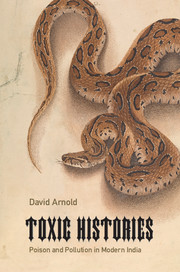Crossref Citations
This Book has been
cited by the following publications. This list is generated based on data provided by Crossref.
Hockings, Paul
Hegardt, Johan
and
Arnold, David
2016.
Visuality in Times Long Past.
Visual Anthropology,
Vol. 29,
Issue. 1,
p.
81.
Arnold, David
2016.
Anxieties, Fear and Panic in Colonial Settings.
p.
49.
Breen, Benjamin
2017.
Drugs and early modernity.
History Compass,
Vol. 15,
Issue. 4,
Rohel, Jaclyn
2017.
Empire and the Reordering of Edibility: Deconstructing Betel Quid Through Metropolitan Discourses of Intoxication.
Global Food History,
Vol. 3,
Issue. 2,
p.
150.
2018.
Edges of Exposure.
p.
151.
2018.
Edges of Exposure.
p.
179.
2018.
Edges of Exposure.
p.
125.
2018.
Edges of Exposure.
p.
105.
2018.
Edges of Exposure.
p.
59.
Wagner, Kim A.
2018.
Fear and Loathing in Amritsar: an Intimate Account of Colonial Crisis.
Itinerario,
Vol. 42,
Issue. 1,
p.
67.
Fisher, Michael H.
2018.
An Environmental History of India.
2018.
Edges of Exposure.
p.
143.
2018.
Edges of Exposure.
p.
85.
Widger, Tom
2018.
Suicides, poisons and the materially possible: The positive ambivalence of means restriction and critical–critical global health.
Journal of Material Culture,
Vol. 23,
Issue. 4,
p.
396.
2018.
Edges of Exposure.
p.
25.
2018.
Edges of Exposure.
p.
1.
Kirchhelle, Claas
2018.
Toxic Tales—Recent Histories of Pollution, Poisoning, and Pesticides (ca. 1800–2010).
NTM Zeitschrift für Geschichte der Wissenschaften, Technik und Medizin,
Vol. 26,
Issue. 2,
p.
213.
Monnais, Laurence
2019.
The Colonial Life of Pharmaceuticals.
2019.
Bacteria as a Murder Weapon: A Tale from Colonial Calcutta
.
Bengal Physician Journal,
Vol. 6,
Issue. 2,
p.
37.
Bertomeu-Sánchez, José Ramón
2020.
Poisons in the Twentieth Century: Unpunished Crimes, Slow Violence and the Role of History.
Cahiers François Viète,
p.
105.





